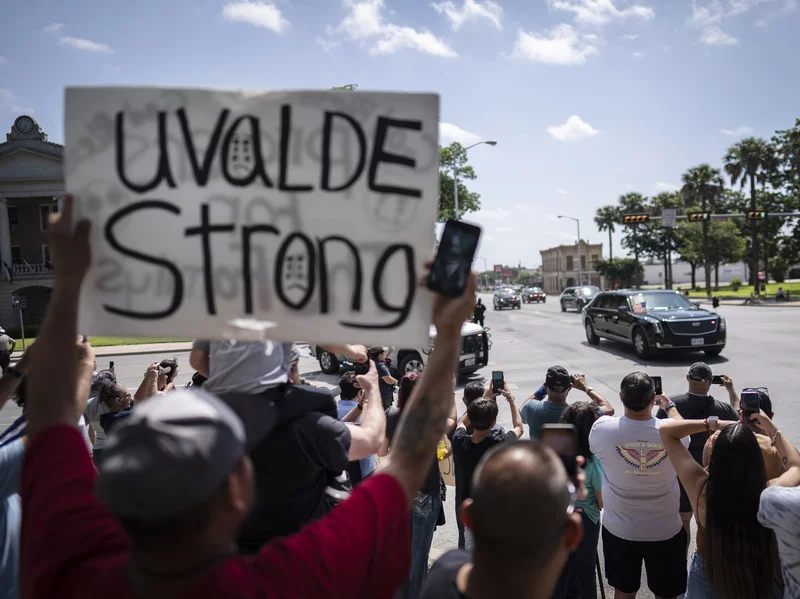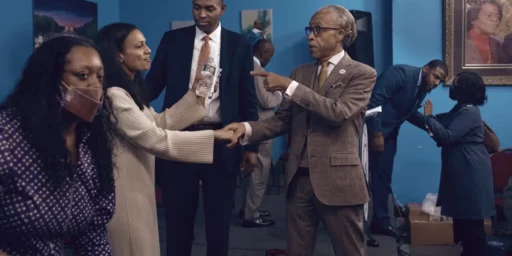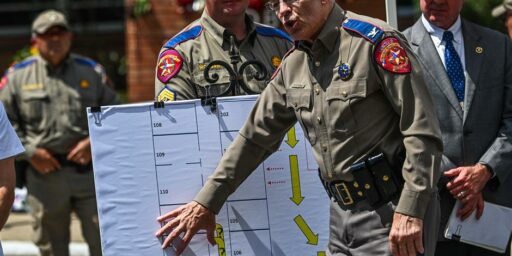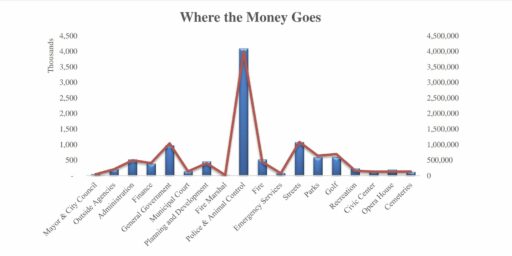The Anglicization of Spanish Place Names
You-VAL-dee? You-VAHL-day? Oo-VAHL-deh?

NPR’s Isabella Gomez Sarmiento argues that “How we pronounce Uvalde says a lot about the power of language in mixed communities.”
You-VAL-dee.
You-VAHL-day.
Oo-VAHL-deh.
When tragedy struck Uvalde, journalists flooded into the small Texas town to report on the aftermath of the shooting at Robb Elementary School.
That included NPR’s own team — and it didn’t take long for discussion to break out amongst staff about how to say the name of the town on air.
First, there was “you-VAL-dee,” the anglicized pronunciation that’s commonly accepted by locals.
But some people there also call it “ooh-VAHL-deh,” closer to the Spanish pronunciation, or “you-VAHL-day,” which sounds like a middle ground between the two.
I don’t believe I’ve heard any coverage of the story, although it’s possible it’s been mentioned on a podcast I listen to. But I’ve been reading it as some variant of the last two; it would never have occurred to me to pronounce it “You-VAL-dee.”
Because Uvalde is a town made up of mostly Latino or Hispanic residents, according to the U.S. Census Bureau data, landing on a “correct” pronunciation is tricky — the language of the people who live there exists on a sliding spectrum between Spanish and English, and often consists of a combination of the two.
But how we say Uvalde matters, because it represents a long lineage of how Latinos have been racialized in the U.S. and in South Texas, specifically.
[…]
Uvalde is just one example of how many Spanish-origin words are anglicized in Texas and other parts of the country — names like Del Rio, San Marcos, Refugio, or even Los Angeles and San Francisco.
I strongly suspect that this controversy, much like that over LatinX or whether politicians with Hispanic surnames get to call themselves Hispanic, is more elite inside baseball than something ordinary Latino and Chicano Americans are worried about. Still, the history is undeniable:
“We know that English was forced upon Mexican-ancestry people living in Texas, probably beginning with the Texas War of Independence and thereafter,” says Ainslie. “Spanish was forbidden in schools and children were punished for speaking it.”
Spanish itself is an imposed colonial language, forced upon the native Indigenous people of the region. But there’s a difference between the way language is understood in Latin America and in the U.S.
In this country, language became a signifier of race, says Kirsten Silva Gruesz. She’s a professor of literature specializing in Latino and Chicano literature at the University of California Santa Cruz, and author of the forthcoming book Cotton Mather’s Spanish Lessons: A Story of Language, Race, and Belonging in the Early Americas.
“There’s an additional layer within the U.S., which is that [Spanish] is a language that was associated with a certain kind of working-class identity,” she explains. “It was associated with people who were racialized, who were discriminated against, who were prohibited from using certain drinking fountains or coming into certain schools.”
A Mexican American teacher at Robb Elementary still remembers parents complaining about white teachers spanking their kids for using Spanish in the late ’60s.
During that time and into the ’70s, the Chicano movement took hold across the country in an attempt to empower Mexican Americans and other Latinos to demand equal rights and recognition. Part of the work of Chicanx activists and writers included reclaiming Spanish and Indigenous languages, and honoring their African roots.
All of these factors, Gruesz says, demonstrate how language became one of the first true markers of Latino identity in the U.S. — a category that is still difficult to understand today because it comprises so many different races, backgrounds and experiences, all building communities together through shared communication and cultural understanding.
I lived in Texas for a number of years, including a year and a half in El Paso when I was in 8th and 9th grade, but was really too young to fully understand the dynamics at play. I’ve mostly lived in the South or on military bases and thus much more steeped in the legacy of anti-Black racism.
In terms of the language issue, I find it interesting the degree to which we’ve used Native American or Mexican names for places. Indeed,
Uvalde was originally named Encina, after the oak trees that grow there. It was later renamed in honor of Mexican governor Juan de Ugalde and incorporated as a county seat in 1856.
Because the town’s name was misspelled from its namesake, the way to pronounce it is inherently complicated, says Ricardo Ainslie, director of the Mexico Center at the Teresa Lozano Long Institute of Latin American Studies at The University of Texas at Austin.
These names are so ubiquitous as to be unremarkable. For example, I remember hearing about the Encino neighborhood in Los Angeles all the time on television and I’m not sure I ever gave any thought to it being a Spanish name. Certainly, I didn’t know that it meant “oak.” For that matter, while “Los Angeles” is obviously from the Spanish, it’s just so much part of American culture that it would never occur to me to pronounce it in other than the Anglicized manner.
Still, as the influence of Latin culture grows in the United States, it has inevitably changed our language in subtle ways. Way back in 2009, when President Obama appointed Sonia Sotomayor to the Supreme Court, there was a minor controversy over the fact that some were mispronouncing her name and I observed,
I’m in agreement with Mark Krikorian that “Deferring to people’s own pronunciation of their names should obviously be our first inclination, but there ought to be limits.” Where to draw the line, however, is unclear.
He continues that “Putting the emphasis on the final syllable of Sotomayor is unnatural in English (which is why the president stopped doing it after the first time at his press conference).” That was probably the case twenty years ago but, although I’d only read Sotomayor’s name until this morning, my mental pronunciation of it in fact put the emphasis on the final syllable. Hispanic names are now sufficiently common that they’ve become part of American culture.
But it’s a complicated matter. Oftentimes, it’s not immediately obvious to an untrained observer whether a name is, say, Hispanic or Italian. Or, whether one’s family has Anglicized the name along the way. For example, on last week’s Best. OTB Radio. Ever., it occurred to me that although I’d been reading Bill Roggio for years, I didn’t know how he pronounced his name. My internal version was something like “ROW gee Oh” and it turned out to be more like “RAH ghee Oh.”
Again, though, this is mostly a problem for those of us who get our information almost exclusively through reading. If one is, say, an NPR reporter covering the tragic events in Uvalde, one would presumably hear how locals pronounce it. If not, one can simply ask. Only if there’s a serious divide in Uvalde—with the Latino population insistent that it be pronounced one way and the Anglos adamant that it’s the other—does it become problematic.
Still, as I closed the aforementioned post,
Ultimately, American English both evolves and has regional variants. The further a foreign pronunciation differs from sounds familiar in American English and its local dialects, the less likely we are to adopt it. But once-unfamiliar names can become familiar over time. I’m sure even in Tuscaloosa, they pronounce our president’s name “Oh BOM uh” rather than the more natural “Oh BAM uh.”
The bottom line is that American English is much more diversified on this front than it was when I was a kid. Even those of us who aren’t Spanish speakers naturally incorporate Spanish words into our speech and pronounce words that look Spanish in something that roughly resembles Spanish. (That is, while it would never have occurred to me to pronounce “Sotomayor” as “soda-meyer,” I don’t roll the final R.)
Indeed, we often overcorrect. For example, because I knew who Sophia Loren was well before I’d heard of Ralph Lauren, I long pronounced his name the same way I did hers even though his name is actually pronounced LORE-en rather than lo-REN.
Relatedly, while we have, through immigration and assimilation, long since incorporated various Italian, German, and other words and names into American English, we’ve tended to Anglicize them much more than we do Spanish. Presumably, that’s a function of the continued influx of large numbers of native speakers.






Hmm. I never would have thought to pronounce it You-vahl-day. That initial U is obviously an “oo” sound to me, and the trailing e is somewhere between “ay” and “eh” (but then, I also pronounce Uruguay as “OO-roo-gwai” with a percussive (not rolling) R ).
There are limits to how well one can pronounce a language with phonemes different from one’s native tongue, either as expressed orally or represented in writing.
Plus what I’ve said about geographic names, which tend to be different in every language.
It’s not a big deal.
Having been bilingual (French) at an early age, I’m usually good at guessing the pronunciation so long as we’re dealing with a romance language. So should I mention that I’m in Pah-REE? If I go to Barcelona should I use the Catalan or Castilian pronunciation? Is the capital of Germany Bare-LEEN? Can I still go to Japan or do I have to go to Nee-PON and/or Nee-HON?
For years I kept hearing that Qatar was supposed to be pronounced GUT-ter. I sensed that was bullshit and recently, while in Qatar, learned that indeed it is pronounced Kah-tar.
How about this: we use language as an instrument of communication and pronounce words in the way most likely to be understood by the person we are addressing? With the added caveat that sometimes we simply cannot with our English-speaking brains and tongues we simply cannot manage some pronunciations?
Further observation:
I tend to mimic accents (not to tease, just because it seems natural to sound like the people around me). I could never hear the Chinese accent, however (possibly because where I was was 60% migrant, and everyone had a different regional accent). Or so I thought. When I was going through airport security one time, I was asked my destination, and replied “Shanghai”. The security officer replied “Oh, you have been living there a while, haven’t you? You say it like a native.”
I started paying attention to how I pronounced place names, and realized that I say them closer to the local way than the American way–just because I’d heard them so often from colleagues who lived there.
Berlin = bare-Leen
Zimbabwe = Zeem-BAH-Bway
Panama = Bah-nah-mah (the initial consonant is between a P and a B)
Shanghai = Shahng-hai (The initial “SH” is “dark” like the TI in “nation”, not clear like “she”)
Language and pronunciation change continually with the churn of cultures and generations and intent. Recently I heard someone who, like me, was born and raised in Illinois pronounce it “El ih Noise”. As a teenager it would have horrified me by it’s wrong-ness, but given that I am no longer an adolescent I instead wondered if it signaled a general change in pronunciation or just a regional variation.
@Mu Yixiao: And, at least to my ear, there is no concept of “accenting” a syllable in Chinese, perhaps because that is subsumed by the tones. I suppose you could say the second syllable of “Beijing” is stressed but to me it sounds more like “Bay-Jing”, two separate one syllable words with very little gap between, and two different tones. And the “Jing” is pronounced how it looks, not as “zhing”. But I also recognize that now that I’m in the US again, the way I pronounce Beijing and Shanghai might come across as a distracting affectation. It is not wrong or disrespectful to fail to pronounce a place like a native speaker, at least if you haven’t been trained in the language. And even if you are, which accent? Is choosing the wealthy, educated pronunciation over the poor slum one also offensive?
All too often this type of thing is just people who find fault as a hobby inventing new ways to keep score.
This reminds me of the following from a Lyle Lovett song, “South Texas Girl”
Palacios is a great example. In Spanish it should be “pal-ah-see-os” but folks pronounce it “puh-lashes.” Refugio is also angelcized.
And, without any doubt, these pronunciations are the result of English domination of a land that was at one time part of New Spain/Mexico.
Texans, of which I am one, have some curious pronunciations of a number of place names.
Robert Mueller Airport is pronounced “Miller”
Manchaca (both a road in Austin and a nearby town) pronounced “Man-shack”
Buchanan Lake is “Buck-cannon” (not Byoo-cannon)
The town of Buda is pronounced “Byoooda”
Boerne is pronounced “Bernie”
I could likely go on, but memory fades after almost a quarter century of being gone.
And then there’s Versailles, IN, pronounced “Ver-sales.”
@Mu Yixiao: The /sh/ pronunciation you mentioned is interesting to me. I don’t hear a difference between “she” and “nation.”* On the other hand, my hearing has taken a turn for the worse, so it might be that I’m simply not remembering when I could hear a difference.
* Well, I do hear a difference–“she” has a “long-E” (/ee/) and “nation” has a schwa, but the vowel accent doesn’t change the sound of the consonant to my ear.
@CSK:
Not to forget Calais, ME that is pronounced Cal-ess
@CSK: @Sleeping Dog: And Cairo, Georgia, pronounced “KAY-ro.”
I suspect that this could be a big problem with French names (Des Moines, or the Native American-to-French Illinois…) than with Spanish (fortunately, I think there is not a significant Francophone population in Upper Midwest). I think Spanish (with the exception of “J”) has a largely phonetic transliteration, meaning that the Spanish to English difference are probably more of accent (or where is the tonic syllable) than of real pronunciation (I hear in the movies the Americans saying “Los Angeles” or “San Francisco” and don’t sound much strange for a Portuguese)
@Mikey:
And of course, Kay-ro, Ill.
La-FAY-ette is a very popular around these parts. Cities, streets, counties, parks, etc . When I first landed here and unknowingly used the French pronunciation, I was politely corrected. Ver-sales is another I muffed on arrival.
Knowing and using the local vernacular is essential for social acceptance in some circles. Otherwise, Carpetbagger!
@Steven L. Taylor: @Mikey: Yes, these examples about. Alabama has towns called Arab (A-rab) and Lafeyette (le-FAY-ut). And that’s to say nothing of all the mispronunciation of Native-derived names.
I actually taught a class in Cairo, Georgia about a quarter-century ago. The high school sports team was known as The Syrupmakers. I assumed it was the home of Karo syrup but, no, it had been a Roddenbury’s plant.
When I lived in IL I heard someone talk about the native Indian and French origins of names, so that it should be SHE-kah-goo, Iln-wah
When I lived in New Orleans it was before the age of online directions. Someone had given me very clear directions to some place or another and I was fine until I had to turn on a particular street, which I heard as Kay Lee something or Kayleigh something. Maybe “Kayleigh Hope”? I passed Calliope Street twice before I realized that I was going to have trouble with all the streets named for the Greek Muses.
It’s been 61 years since my family relocated from Monroe County, New York when I was 13 and I’ve only returned there once briefly in 1995. However I do recall my parents and other adults calling the Town of Chili, New York:
(no disrespect to the beans intended)
In Illinois where I live today there are Du Quoin:
and Vienna:
not Vee enna.
And Eldorado
not El dah rah do.
And don’t forget the British pronunciation of Luxury Yacht as Throatwarbler Mangrove.
@Michael Reynolds: GUT-ter is indeed a silly barbarism as a “should be pronounced” and illustrates such attempts sterility in general.
It’s true that in bedouin-nomad spoken dialects the Qaf (whose modern spoken prounciation is not too far from the English Q sans the “wa” Anglos habitually attach) becomes a hard G, but the real pronunciation isn’t like “gut”, not really.
Better to say ‘kahtar’, actually rather closer (or if one wants to be a bedouine, ‘gahtar ‘although why one would desire to sound like a rural hick escapes).
No, I would never have thought to say “You VAHL day” either. In my head it’s “Oo VAHL deh” or some such.
Yeah, most of the “Spanglish” place names here in CA are close, but usually not quite spot on. Often because they use phonemes we don’t have in English. Such as Vallejo. It’s not the ‘j’ that’s a problem, we have figured out the “j means h” thing. For San Jose, for instance, or San Joaquin. No, but Vallejo has the Spanish “ll” which makes the Spanish pronunciation actually something like “Val yay ho”. Nobody says it that way. It’s “Val lay ho”.
We have a city – Milpitas – that is named after a ranchero family that lived there, but whose fortunes took a decided turn for the worse when the US annexed California. There people killed and buildings burned.
Meanwhile, just a dozen miles away the city Mountain View is built on top of the location of the Castro family ranch, and its main street is called Castro Street. It’s a really mixed history.
My favorite place name has got to be Vacaville – its in the Central Valley, and its name is a language hybrid the Spanish “vaca” for cow, and “ville” for village or town. So it means “Cowtown”.
I have somehow never heard it pronounced, and settled on OO-vald, perhaps assuming that there was a Dutchman involved in the naming. Lars Uvalde could have settled on prime land that he stole from the Mexicans, and ignored the name they had given it, just as the Mexicans ignored the native name. Totally plausible.
It should be noted that I know absolutely nothing about the Dutch other than dykes and carrots and tulips.
When I was an infant Navy brat, my parents lived in family housing in Long Beach, CA. Near “Junipero Avenue”, which I understand even the locals argue about.
This thread reminds me of this gem from WKRP’s own Les Nessman.
@gVOR08: Detroit is French, so should be “Day-twah” or something like that rather than “Dee-troyt.”
Also in Michigan is the town of Frankenmuth, which everyone pronounces “Fraynkinmuth.” In German it’s “Frahnkenmoot” because the “h” is silent when “th” ends a German word. (German doesn’t actually have a “th” sound like English does anyway.)
@Mikey:
I know what that is without even clicking the link. 😀
@Just nutha ignint cracker:
The difference is small, but very pronounced if you know what you’re listening for.
The bright “sh” (she or shin) comes from just behind the teeth; the tongue goes up in the middle and down at the tip.
The dark “sh” (nation or should) comes from a little further back in the mouth; the tongue goes down in the middle and up at the tip.
Chinese does the same thing with the bright (Q) and dark (CH) “ch” sounds.
And English does it with the L sound (not the difference between leaf and call).
I don’t think I have a place I can upload an audio file, or I’d give examples of the Chinese pronunciations.
@Mikey: I’ve assumed it would be pronounced like the Montreal Symphony conductor Charles Dutoit, which, as you say, seems to be Due-twah. I really had to fight spell check for that, it kept insisting on Due-’twas.
@Just nutha ignint cracker:
Ah! Google Drive. See if you can here the difference in these sounds.
SH and CH
@Mu Yixiao: And there’s this which…wow.
施氏食獅史
@Jay L Gischer: I would have thought it would be “va yay oh,” but it’s been a long time since my ex-wife put herself in charge of my pronunciation of Spanish words.
@Just nutha ignint cracker: And I (mis?) pronounce the big city in the Silicon Valley “Sa nosai,” for the record.
@Mikey: Just no. Anglicized versions are pronounced the way they are to avoid the problems that my fellow teacher, Arnold Du Toite, had with people pronouncing his name with the Francophone pronunciation because they thought he was a douche (they were right, btw).
@Mu Yixiao: Okay. If you say so.
Can anybody explain how “Duquesne” became doo-KANE??
Had an English prof who thought he could. Said that all phonetic written languages must be revised over time or doomed to becoming ridiculous as there is no stopping people from changing pronunciation. French is filled with so many extra letters because it’s an old language. The extra letters represent sounds which were at some time voiced, just not any more, and the culture does not permit spelling revisions. English will someday be just as sillily spelt.
He said the reason ancient Chinese writings are roughly understandable today is due to the writing being pictographic instead of phonetic, but you can bet the farm the ancient Chinese spoken language would be incomprehensible to modern Chinese and visa versa.
Mu, wat ar yor thots on that?
Here are two great ones:
Nacogdoches, TX (pronounced nack-a-do-chis)
and
Natchitoches, LA (nack-a-tish)
@Steven L. Taylor:
I was going to bring that up!
But… I believe you may have them reversed. When I was in Texas, I heard it as “Nack a dish”, and when I was working in the supermarket up here, I met a couple from Louisiana (loo see anna) who pronounced it “Nack a do jez”
@Just nutha ignint cracker:
You can’t hear the difference?
Wow.
@Mu Yixiao: I thought it was going to be Chi Hua Hua, but I was wrong. Mr. Nessman butchered many words and names.
Natchitoches, LA
I see Professor Taylor beat me to it.
College town. Nice place.
For the record.
Nacogdoches, TX
I have not been there.
I’m not going to get in the middle of this one.
Per WikiP
I’ve heard both from different people who have lived there.
The Pedernales River southwest of Austin, TX is pronounced PUR-da-NAL-iss, as if the r appeared before the d instead of a couple of letters after it. Man, you can get one heck of a sunburn tubing there, with the sun overhead and the bounce off the water and limestone cliffs.
Ah, come to the UK, and ponder the possible pronouciations of Dubh Artach, Bwlchgwyn, Sgurr na Banachdich, Rhydymwyn, Ysbyty Ystwyth, Cwmystwyth, Beaulieu.
The Welsh gave up expecting the Saesneg to get it right millennia ago.
For that matter, Americans usually get Gloucester wrong.
@JohnSF:
They get our Gloucester wrong as well.
And then there is the struggle of pronouncing Worcester, colloquially Wis-ta.
@dazedandconfused:
There are a couple things going on here.
1) Ancient “Chinese”* uses what are now called “traditional” ideograms. These are still used in Hong Kong (Xiang Gang) and the Guang Dong (Canton) region. Most of Mainland China uses “simplified” ideograms. It’s like the difference between calligraphic scripts in Celtic Bibles and what you’re seeing on the screen right now. Traditional ideograms are still taught in schools (to some degree), but they’re essentially part of history or “foreign language” classes. I wouldn’t be surprised if Chinese kids born today never learn traditional characters more than just in passing.
2) The shared written language is a massive bridge between those who don’t speak “Mandarin” (pu tong hua–the official dialect of China) or for whom accents and local idioms are unintelligible. One of the strangest things to me when I first arrived in China** was seeing people “write” on their palms. When a speaker could see that a listener didn’t understand a word, the speaker would “write” that word on their hand with their finger (just gestures, no actual ink or anything). In this way, people who didn’t speak the same language (or couldn’t understand each other) could communicate.
3) English spelling. Ugh. I’m of two minds on this.
a) English spelling won’t simplify. We’re too used to our spellings (in all their stolen splendor) and won’t give them up. At least not in formal discourse. Or literature. One of the wonderful things about the fucked-up spellings in English is the ability to create puns and word games. And, I believe, we’re the only language in the world that can have spelling bees. Other than tossing out those useless U’s that the British insist on stuffing in everywhere, American (as distinct from English) has stubbornly stuck to our archaic, anachronistic, confusing, and sometimes counter-intuitive spellings. We take pride in it.
b) English spelling has been simplifying for decades: lite, nite, thru, etc. And don’t get me started on text-speak (which actually started back in the days of the telegraph–for both efficiency of transmission and keeping the cost down–and was very popular in the days of personal ads that charged by the letter). The problem with text-speak (and, to a degree, simplified spelling) is that it crosses over heavily with vernacular. And vernacular requires a cultural… zeitgeist… in order to understand. And that zeitgeist is frequently tied to a specific time period and location. In 50 years, TFG and GQP will probably be difficult to understand. And IOKIYR will be completely confounding (I actually had no clue what it meant; I had to look it up).
The one thing we have now–and going forward–that we didn’t have in the past is the internet. And with that comes astounding tools such as Google Translate, WeChat Translate, and the Urban Dictionary.
=====
* There are, depending on how you count them, at least 400 distinct dialects that are–to one degree or another–mutually unintelligible. They all (mostly) use the same ideograms, so technically they might be called “one language”.
** Again, I was in a city that was 60% (domestically) migrant. It would be like living in a city in the UK where 60% of the people were from all across Europe, and only spoke English as a second language with enough proficiency to get the credits to graduate high school.
@JohnSF:
I’m sorry. Welsh is disqualified from this conversation due to the written version being created by Belgian monks tripping on mushrooms.
A fun little anecdote about cross-cultural pronunciations:
I have a friend who was one of the few Chinese high-school students I taught. While she was still in HS, we were talking about bikes, and she said she wanted to buy a “fee-shee-ay” bike. I asked if that was a brand name, and she said no; it’s a style of bike. I’d never heard of such a thing. I ran it through my head for a minute and then I realized she was pronouncing an English word using Chinese pronunciation rules: Fixie
@Mu Yixiao:
It’s not just Cymraeg; two of those names were Scots Gaelic, and one Norman French. 🙂
And let’s not even to begin to get started on the peculiarities of Lallans, Cornish, or (above all) Irish Gaelic.
@Sleeping Dog:
I spent a week in Woouh-stah. I worked with Mahty and his bruthuh Pually (I have no fucking clue how to represent their accent). 😀
@JohnSF:
Again. Disqualified based on the stoned Belgian monks.
It’s well known that all place names in the British Isles are named with the express purpose of fucking with tourists.
All depends upon said tourist, y’know.
Consider Fingeringhoe for a happy bank holiday weekeend.
One last comment (probably) before I go watch some movies and sip some whiskey (with an e).
I went to college in Green Bay, Wisconsin. Place names around there (and throughout the state) are a weird mix of French and Native American. A room mate worked for a local radio station who hired a company out of Texas do to their commercials and promos. They’d have to send stuff back all the time because the voice talent couldn’t pronounce Shawano (“SHAW-no”, not “sha-WAH-no”) or Waube Lane (“WAW-bee” not “Wah-YOU-bee”).
In my 4th year, a young woman transferred from Hawaii to Green Bay (let that sink in for a minute). She couldn’t pronounce any of the French or Native American city names, and it frustrated her.
One day, we were out on one of one of our “land-yacht cruises”* with Molly along, and we passed the city limits sign for Kaukauna.
Molly shot up in her seat and exclaimed “I can pronounce that one! “KAH-ooh, KAH-ooh, nah”.
We all did our best to contain our laughter, and informed her that it’s “k-KAW-nah”.
But, in my mind, until the day I die, it will forever be KAH-ooh, KAH-ooh, nah
=========
I inherited a 70’s Chevy Malibu from my parents. I could fit six adults with plenty of comfort room. We would frequently head out on random directions (we would actually roll a die to decide which way to go at any intersection or ramp–or ask our resident 4-year-old (which led to us realizing that a 4-year-old doesn’t understand that “forward” is a direction, not a destination)).
@JohnSF:
Cholmondeley = Chumley
@JohnSF:
There’s a Gloucester, Massachusetts, which we pronounce “Gloster.”
@Mister Bluster:
I have it on authority of a native that the town was historically pronounced “boor BOH niss” until the City decided to rebrand itself (with mixed success) as “boor boh NAY.”
My favorite story was getting onto a phone call and identifying my client as coming from “Mar sales,” Illinois and being told by a national representative of the other party that the word is pronounced “Mar SAY.” Not in Illinois, ma’am and the meeting didn’t get better.
@CSK:
Bottomley = Bumley
Brit joke 🙂
@Steven L. Taylor:
When living and working in Austin, I refused to call it anything but mahn-CHA-kah, as it’s the proper Latino pronunciation.
I also refuse to pronounce Tesla as TEZ-luh, as Muck does. It’s TES-luh.
I meant Musk, but Siri autocorrected it to Muck. Still works.
AI is here and it’s smarter than we are.
@CSK:
That’s how we sez it!
Maybe it’s southern or midwestern Americans who say glouw-sesster?
I vaguely recall reading somewhere that American pronunciation defaults changed a lot due to the influence of German speakers who were switching to English in Pennsylvania and the Mid West.
And also perhaps of southerners who retained older English pronunciation patterns: IIRC the late middle English would have pronounced Gloucester as “Glouster” or “Glou’ester” not (modern form) “Gloster”.
@JohnSF:
As far as I know, there’s only one Gloucester in the U.S., and it’s about 30 miles from where I sit typing this. Right on the Atlantic coast. Superb seafood.
I agree; the tourists you hear mispronouncing the name aren’t from hereabouts.
@Mu Yixiao:
Austria had an actual town named Fucking, but changed it to Fugging last year.
@Joe:..Bearbonnais…
Apparently that’s what some fans called it when the Chicago Bears held summer training camp at Olivet Nazarene University 2002-2019.
@Mu Yixiao:
Most people figure there is a New England accent and maybe a Boston accent, when in truth there are 100’s. Even to the point where you can pick the community where someone grew up buy the accent. And as my wife likes to point out, she didn’t know that the word ‘sure’ had two syllables, shoe-uh.
@Sleeping Dog:
Don’t forget the old-timers’ habit of putting the letter r where it isn’t and removing it from where it is, as in “Cuber” for “Cuba” or “lobsta” for “lobster.”
Actually, that would be “lawbsta” for “lobsta.” My mother was Connie, but it became “Cawnie” up here.
@Sleeping Dog: When I lived outside Dallas it seemed like there was a contest to see who could get the most syllables into “yup”. Five, as “Ah yai ee yuh up” seemed common.
@Michael Cain: Great example (and a lovely park!).
@Mu Yixiao: Actually, I don’t have a Google identity to open Google Drive with, so my computer told me that the files could not be played. But my comment was for your earlier comment.
@CSK: That’s interesting. The old commercial for the frozen fish sticks pronounced it “glass ter.” (Or is that a different place?)
@Mu Yixiao:
Nope, definitely not reversed. I think you are conflating the two places and assuming that you were hearing two different pronunciations of the same place. Nack-a-do-jez is in Texas and Nack-a-dish is in LA.
Gimme a break! : All Western languages are in flux. Much of the language changes are due to new words in technology.
Supermarket became supermercado. Automovil became el carro and VW beetles became carritos, or little cars. After eating, the restaurant would present you with la Cuenta, or the count. Today along the border in Texas, Tex-Mex calls it el cheque, the check. In Europe, there is le blastoff, and of course, the world-wide usage of OK.